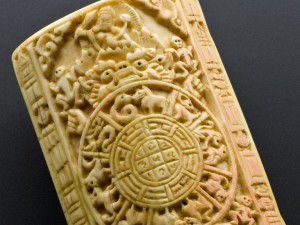For this study of the Vimalakirti Sutra I have been referring to four different translations. My primary source has been Robert Thurman’s text; the root base of his text is akin to another, truly marvelous, translation by the renowned Belgian scholar and Indologist, Étienne Lamotte; Lamotte’s translation was difficult to come by. It was long out of print and the surviving available hard-copies were too astronomical in price. Fortunately, I was able (finally, just two weeks ago) to get a recently released softbound copy from the Pali-Text Society (being more than willing to become a member to do so). Lamotte’s version is fantastic in the depth of its scholarly impetus and encyclopedic footnote material. The other translations utilized are by Charles Luk and Burton Watson. Thruman’s text has been magnificent, although he incorporates the remaining chapters into one (naming it epilogue), basically to guarantee the apparent original 12 chapter text, in league with Lamotte. Both Luk and Watson have broken it up into two—and for salient reasons I am following their lead, since the last chapter is basically ascribed to Maitreya, which is as it should be.
13.Dharma Offering
This chapter opens up with Śakra (who others ascribe as being Indra) the prince of the gods expounding on how Vimalakirti’s discourse should be placed uppermost in the annals of Sutras—such is its astounding transcendental reality. Once again it is reinforced that anyone who reads or recites this sutra will receive untold divine recompense—Śakra even assuring divine protection. Also, as with most other revered Sutras and tokens that are ascribed with the Buddhadharma, special reliquaries and stupas (mound-like structures) are created for their reverence. The Buddhadharma is paramount within Buddhism, and this chapter wastes no words in assuring its reverenced place in the Bodhisattvic Way and with other lesser paths as well. This is traditionally known as the Offering of the Law. A Tathagata, Bhaisajyarāja, also known as a Medicine Buddha, when questioned as to whether there is anything else that supersedes this Law expounds as follows:
(Watson’s Text) ‘Good man, the offering of the Law means the profound sutras preached by the Buddhas. The people of this world all find them hard to believe and hard to accept, for they are wonderfully subtle and hard to make out, clean and pure and without stain. They cannot be grasped through the making of distinctions or through thought. They are contained in the storehouse of the bodhisattva and are sealed with the dharani seal, and where this seal is affixed, one reaches the level of no regression. They bring about observance of the six paramitas, the skillful discrimination of meanings, and compliance with the teachings of bodhi, and through the finest of all sutras one enters the realm of great pity and compassion. The sutras put an end to all devilish affairs and all erroneous views, conform to the teaching on causality and those on no ego, no individual, no living beings, no life span, emptiness, no form, no action, and no arousing. They enable living beings to sit in the place of practice and to turn the wheel of the Law.’
(Luk’s Text) ‘Virtuous one, the offering of Dharma is preached by all Buddhas in profound sutras but it is hard for worldly men to believe and accept it as its meaning is subtle and not easily detected, for it is impeacable in its purity and cleanness. It is beyond the reach of thinking and discriminating; it contains the treasure of the Bodhi-sattva’s Dharma store and is sealed by the Dharani-symbol; it never backslides for it achieves the six perfections (paramitas); discerns the difference between various meanings; is in line with the bodhi Dharma; is at the top of all sutras; helps people to enter upon great kindness and great compassion; to keep from demons and perverse views, and to conform with the law of causality and the teaching on the unreality of an ego; a man, a living being and life and on voidness, formlessness, non-creating and non-uprising. It enables living beings to sit in a bodhimandala to turn the wheel of the law.’
This truly says it all for the value and significance of a given Sutra. Sutras are sealed with a special “dharani”—an invocation and protection, a Mark against Evil. Thus anyone merely reading the sutras with indifferent and worldling eyes, with no real appetite for the Buddhadharma, these sacred texts come across as boring, obscure and simply unfathomable. The real stuff—the Bodhi-dharma—will be conferred upon those who authentically and reverently approach these texts with no other intention other than to receive the auspicious blessings and insights of the Tathagatas contained therein….if one does so in this manner, then they are bade entrance into the Dharma-store and can truly partake in its mystical riches; in this fashion, and with continual and abiding reverence each time one picks up these sacred texts, a mystical “bodhimandala” will form around them—preventing outside influences from disturbing these loving mystical revelations. Please keep in mind above all, as this sutra states, “the offering of Dharma is the highest form of offering to all the Buddhas” and thus should never be read haphazardly or taken lightly.

